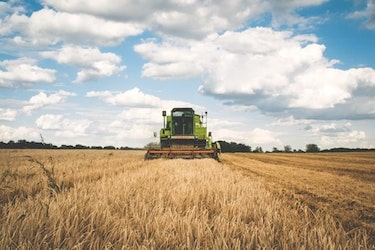 Is there a more important industry than agriculture? This industry feeds the world, supplies energy, and creates millions of jobs in the United States and abroad. If you want to be part of this essential industry, you need the right education. With a top-quality degree or certificate, you can become a leader in a rapidly-changing business.
Is there a more important industry than agriculture? This industry feeds the world, supplies energy, and creates millions of jobs in the United States and abroad. If you want to be part of this essential industry, you need the right education. With a top-quality degree or certificate, you can become a leader in a rapidly-changing business.
Agriculture, the study of food and farming, is a popular distance degree major for students living in rural areas and developing countries. The online agriculture degree has enjoyed a rise in popularity for two reasons. First, mass food production and mega-farming requires mastery of ever-more sophisticated scientific planting and harvesting techniques. These scientific techniques are being engineered inside university labs, making colleges leading agricultural education centers. In addition, organic and sustainable agriculture is of wide interest around the world. Global warming and related trends have led to an awareness of the need to preserve natural resources such as clean water and fertile soil around the world.
THE CAREER PATH
If you complete a degree in agriculture, there are many different career paths you can take. Much will depend on the specific degree you choose, however. For example, if you complete a bachelor’s degree in agricultural business, you could work as a farm manager, which combines the business practices of managements, budgeting, and planning with the need for responsible farming practices. Or you could complete a master’s of science in food safety regulations, which will make you an important part of the global food industry.
There are many opportunities available for people who have an education in agriculture, but the main advantage of working in this career field is that you get to work in an exciting, important industry that helps shape the health and wellbeing of individuals, communities, and the planet as a whole. Working in agriculture, you’ll have the satisfaction of knowing that your work not only helps feed a growing national and global population, you’re also making efforts to limit the negative environmental impacts of growing crops and raising livestock at a massive scale.
Let’s look at a few of the wonderful opportunities available to people with degrees or certificates in agriculture…
- Agricultural Engineer—Agricultural engineers are tasked with solving complex problems related to the agriculture industry. They may address issues such as power supply, efficiency, and facilities, and they typically use computer software to design and create equipment and systems that will make for a strong, more sustainable industry. One of the top advantages for working as an agricultural engineer is the excellent pay. The median salary is over $74,000, and if you are in the top 10% of the position, you stand to earn over $114,000. With an expected job growth of 8%, it should maintain excellent growth, and the minimum requirement of a bachelor’s degree means the career is very accessible.
- Food Scientists—Much like an agricultural engineer, food scientists work to improve the efficiency and safety of the agriculture industry. They achieve these goals, however, through different means. Food scientists don’t create new systems or equipment, but instead create new products or develop new techniques for production. Food scientists have an excellent career that brings a high-quality income. The median salary for this position is $62,910, but if you work your way into the top 10%, you can expect a salary over $116,520. There is also expected to be roughly 46,000 jobs in this career, so you should have plenty of chances for jobs.
WHO IS THE IDEAL CANDIDATE?
Sounds exciting, doesn’t it? It certainly is a wonderful career, but working in agriculture may not be for everyone. So how can you know if an agriculture education is right for you and your future?
First of all, you need to make sure you have the right character and mindset for the industry. While the career is largely based on science, math, engineering, and biology, you first need to have an attitude of caring for people and the environment. Agriculture is not just about growing plants and raising livestock, it’s about doing so in a safe, responsible manner. Having an attitude that farming needs to be approached correctly will give you the foundation for a long career in agriculture.
If you have the right attitude, you’ll also need a general ability to perform hard skills, such as math and science. There are a lot of high-minded ideals related to agriculture, but if you don’t understand and excel with the foundations of biology, statistics, and other math and science-related fields, you won’t succeed in agriculture and you certainly won’t enjoy your agriculture education.
WHAT SHOULD I LOOK FOR?
Ready to make the leap into agriculture? Then make sure you understand what to look for in an agriculture program. Agriculture degree program majors also study land and natural resources management. Such studies can be as simple as learning about horticulture for small-scale farming to studying genetic engineering for seed stock. Private farmers with large land tracts may study ranch, farm, grassland or water resources management.
Business courses, as well as science classes, are standard fare in online agriculture programs. Advanced studies sometimes focus on the management of natural resources and lease development by public agencies, such as the federal government or military.
COST
Ready to launch a career in agriculture? Click on a program listing below to get more information on tuition, accreditation, and admission requirements. Compare costs carefully. Programs can cost well below the national average ($30,000-$50,000) or well above.


